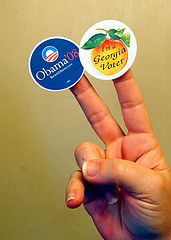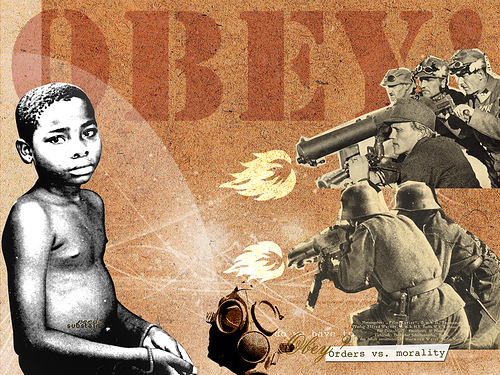Powell Will Vote for Obama
Former Secretary of State Colin Powell has announced that he will be voting for Sen. Barack Obama.
The seven-minute video is worth watching.
[youtube]http://www.youtube.com/watch?v=efv3Vr8T9MA[/youtube]
Former Secretary of State Colin Powell has announced that he will be voting for Sen. Barack Obama.
The seven-minute video is worth watching.
[youtube]http://www.youtube.com/watch?v=efv3Vr8T9MA[/youtube]
I’ve been profoundly disturbed by seeing certain kinds of beliefs and accusations that I’m observing – not only from under-informed folk at rallies, but even from so-called christian blogs and in emails from people who should really know better.

We have a deep need to feel better about ourselves as a nation, but lying to ourselves isn’t the way to do it, and neither is hate or fear or scapegoating or any of those other strategies that have been used here and elsewhere to such destructive effect. Smears, lies, hatred and incitement to violence do not reflect well on anyone. Can we agree on that?

My prayers today are for the ones who consider themselves christians, but are participating in this kind of thing. I sincerely hope that you will be able to receive the guidance that you seem to need, and can re-attune to the deepest message and source of your faith from where you are right now.

Regardless of who you decide deserves your vote, it’s time to get back on speaking terms with the best within you, not the worst.
The state of this country right now can be (at least partially) attributed to the successful demonization of anything and anyone remotely left-wing, liberal, progressive – even centrist Democrat – by the increasingly off-track right wing and its public propagandists. I have been resisting the idea that any significant number of Americans could be taken in by these machinations, but I’ve been thrown off by some of the stuff that I am seeing today. I’m sure you’ve seen some of it, too.
It is not only unseemly and depressing that some Americans can be so easily propelled by the worst that is within them, but it also brings an ethical responsibility for the results. Be careful of what you bring on, Palin and McCain (and all of the surrogate voices).
All of this talk about Barack Obama being an Arab or a Muslim or a terrorist (and don’t all those words start to kind of blend together?) really bothers me on a number of levels.
First, it reveals our national prejudices in a particularly nasty way. Does it not occur to you that there are American Arabs and Muslims? What’s wrong with you?
You can’t conflate these things. All Arabs aren’t bad. All Muslims aren’t bad. Just as all Christians aren’t bad. Think on that. Remember the Crusades, and the Inquisitions, and the way some contemporary Christians want to turn this nation into a kind of theocratic dictatorship that completely misses Jesus’ call and message. The militant and controlling delusions of the super-authoritarian fringes among ALL of the “people of the book” is very troubling.
And then, there’s just the plain facts that Obama is not an Arab. He’s not a Muslim. He’s not a terrorist.
He’s not anti-American.
He’s not a traitor.
He’s not a mole.
I cannot believe I’m seeing this kind of thing.
Barack Obama is not a socialist, either. He’s a capitalist – just not the kind of capitalist that will exploit and plunder our economy or our environment because of rampant corruption and greed. He’s not the kind of capitalist that will appoint former industry lobbyists as directors of the organizations meant to oversee those industries. He’s not going to put the interests of the top 5 percent over the interests of the 95 percent, but he’s not talking a revolution of the masses either. Obama is actually rather centrist, fair, practical and level-headed. His plans call for a strengthening of the middle-class, the backbone of our nation. If the middle-class falls, multinationals will simply take their business elsewhere.
Now, Barack Obama isn’t a messiah either, and those who either over-idealize him or criticize him (on the basis that some people are pretty desperate for such hope as he could represent) exaggerate his importance. However, I think he could do some real good for Americans, for America, and also for world stability. He does make me feel hopeful that we might be able to start to undo some of the terrible damage that has been done.
People have used the methods of terrorism for a long time. Wake up! If you want to fight terrorism, don’t be terrified and manipulated!
Do you really think it’s a coincidence that our friends and allies – after dealing with Bush for 8 years – would overwhelmingly prefer to see Obama elected than McCain? Are they all evil then? Have we become that insular and self-centered and frightened that we can’t take a good hard look at what has happened to our status among the rest of the world’s population? They think the populace here must be stupid and crazy, living in a dream world.
I think that Barack Obama and Joe Biden have a much better chance of helping us to navigate through the next few years than do John McCain and Sarah Palin. I am very disappointed in how McCain has changed, and I’ll be nice and not give you my list of Palin criticisms today.
We really are in a huge mess on a number of different fronts – both internally and externally – and we need the best we can get. My vote is for Barack Obama. As we find out more and more about what the Bush/Cheney administration has really cost us – and I fear we’ve not even seen the half of that yet – we need someone like him.

Found this meme at itisi while I was exploring sites at Entrecard.
Your Debut Album
1 – Go to http://en.wikipedia.org/wiki/Special:Random
The first random Wikipedia article you get is the name of your band.2 – Go to Random quotations: http://www.quotationspage.com/random.php3
The last four words of the very last quote of the page is the title of your first album.If you want to do this again, you’ll hit refresh to generate new quotes, because clicking the quotes link again will just give you the same quotes over and over again.
3 – Go to flickr’s “explore the last seven days” http://www.flickr.com/explore/interesting/7days/
Third picture, no matter what it is, will be your album cover.Put it all together, that’s your debut album.
“Will Fertilize the Soul” by Chihanga
Here’s the album cover. Flickr won’t let me use it, so you have to click to see.
(My friends started laughing before they even looked at the photo.)
“Will Fertilize the Soul” is from “Life ought to be a struggle of desire toward adventures whose nobility will fertilize the soul.†– Rebecca West. Ok, I like the quote. I could do a lot with a song title like that. Maybe I’ll write a poem by and by.
Chihanga is an administrative ward in the Dodoma Urban district of the Dodoma Region of Tanzania. Dodoma? It’s the new capital, but to an American, that sounds like a stupid mommy, or maybe an extinct cellist.
Chihanga? I would guess that Taoists would be a little concerned about the chi that would be a hanga. And it gets worse… chi hanga or hang-a, or ch i ha nga)
The album cover is the Belltower of Cremona (torrazzo) in Autumn, in the Lombardy region of Italy. According to Wikipedia:
The Torrazzo of Cremona (Lombardy, Italy) is the bell tower of the Cathedral of Cremona. At 112.7 metres, it is the second highest lateritious bell tower in the world built, the first being the Bavarian Landshut Cathedral tower.
According to popular tradition, construction on the tower began in 754. In reality, it was built in four phases: a first dating back to the 1230s, up to the third dripstone, a second, between 1250 and 1267, up to the dripstone under the quadriphore, a third around 1284, and the completion of the marble spire in 1309.
Its height is announced by a plaque embedded in the wall at the base of the Torrazzo itself, stating 250 arms and 2 ounces, which in the ancient measuring system of the towns translates to approximately 111 metres.
Archaeological excavations made in the 1980s have discovered the presence of underlying structures which are supposed to be the remains of a more ancient churchyard (or a cemetery associated to it), or even previous Roman buildings.
In the Torrazzo’s fourth storey resides the largest astronomical clock in the world. The mechanism was built by Francesco and Giovan Battista Divizioli (father and son) between 1583 and 1588. The exterior, originally painted by Paolo Scazzola in 1483 but later repainted many times, represents the sky with zodiac constellations and the Sun and Moon moving through them.
I’m guessing that I would love Cremona, but I would have to be very careful to use the Italian pronunciation. The patron saint is… Saint Homobonus, or Sant’Omobono in Italian. Quit laughing! Stop that! Honestly! It just means “Goodman.” He seems like he was like a really super-churchy Santa Claus – he was canonized in 1199 at the urgent request of the citizens of Cremona.
So now my mind is racing, but I’ll resist listing some imaginary song titles for the album and just go to sleep now!
I give up. I can’t get the song “Buzzer” out of my head. It’s been days now, and despite my attempts to put it out of my mind it’s affecting me at a deep emotional level. It’s not unusual for me to have a song running through my head now and again, but this one is a little different. I’m getting noodged (smile-out) to write about it, and it’s clear that I’m going to be haunted by this song until I do.
The song very obviously refers to Stanley Milgram’s famous experiment on authoritarianism, and is written from the perspective of a participant – one of the people who “pressed the buzzer” that appeared to give other people increasingly painful electrical shocks.
Controversy surrounded Stanley Milgram for much of his professional life as a result of a series of experiments on obedience to authority which he conducted at Yale University in 1961-1962. He found, surprisingly, that 65% of his subjects, ordinary residents of New Haven, were willing to give apparently harmful electric shocks-up to 450 volts-to a pitifully protesting victim, simply because a scientific authority commanded them to, and in spite of the fact that the victim did not do anything to deserve such punishment. The victim was, in reality, a good actor who did not actually receive shocks, and this fact was revealed to the subjects at the end of the experiment. But, during the experiment itself, the experience was a powerfully real and gripping one for most participants.
Below you can see a video and the lyrics to the song. A higher-quality version of the song is here at NPR, recorded live in concert from WXPN and Wiggins Park in Philadelphia on July 11, 2008. I would be surprised if Dar Williams doesn’t talk about “Buzzer” in the NPR interview, but I’m resisting listening to it until I’ve worked this through.
[youtube width=”400″ height=”343″]http://www.youtube.com/watch?v=vwvLzG51EWQ[/youtube]
Dar Williams, “Buzzer” (from “Promised Land”)
Sitting with the number eight platter at the restaurant,
Four twenty-nine for almost anything I want,
Add it up, it’s cheaper than the stuff I make myself,
I get by, I never needed anybody’s help,
And I tore out an ad and they told me that I
Would press the buzzer, press the buzzer,
At the graduate lab, they were doing some tests,
I pressed the buzzer, pressed the buzzer.Ride the circle off of the highway.
Spiral into the driveway,
In the maze of old prefabs
They’ll be waiting at the lab.I don’t know how everybody makes it through the daily drill,
Paint their nails, walk a dog, pay every bill,
I’m feeling sorry for this guy that I press to shock,
He gets the answers wrong, I have to up the watts
And he begged me to stop, but they told me to go,
I press the buzzer, I press the buzzer.
So get out of my head, just give me my line.
I press the buzzer, I press the buzzer.Ride the circle off of the highway,
Spiral into the driveway,
In the maze of old prefabs
They’ll be waiting at the lab.They called me back to the lab to discuss the test,
I put my earrings on, found my heels, wore a dress.
Right away I knew, it was like I’d failed a quiz
The man said “Do you know what a fascist is?”
I said, “Yeah, it’s when you do things you’re not proud of,
But you’re scraping by, taking orders from above.”
I get it now, I’m the face, I’m the cause of war
We don’t have to blame white-coated men anymore.When I knew it was wrong, I played it just like a game,
I pressed the buzzer, I pressed the buzzer,
Here’s your seventy bucks, now everything’s changed,
I press the buzzer, I press the buzzer
But tell me where are your stocks, would you do this again?
I press the buzzer,
And tell me who made your clothes, was it children or men?
I press the buzzer.Ride the circle off of the highway,
Spiral into the driveway,
In the maze of old prefabs
They’ll be waiting at the lab.
The opening of the song evokes the character of the singer, a self-reliant northeastern woman of the early sixties. She’s focused on the details of getting through each day, cutting corners, trying to be a responsible person. Seventy dollars for her participation would have been decent pay.
Right from the first chorus, there is something sinister about the people “waiting at the lab,” especially since they are surrounded by all the spirals and mazes in the chorus. The words are reinforced by the melody and the way the sound slows and expands, and the image of the people waiting in the middle of the maze is the last echoing image of the song.
She’s not without compassion. She’s not a sadist. She feels sorry, in a distant sort of way, for the man that she thinks she is training, or punishing, or torturing. His inability to get the answers right is associated structurally with a failure to meet everyday stresses and challenges; an implied judgment is yoked to a certain kind of empathy.
When he begs her to stop, she is told by an authority figure (one of the white-coated men, no doubt) to go on. And she does, without much further comment except the repetition of “I press the buzzer” throughout the rest of the song.
She would have been one of the majority who continued to press the buzzer (the button, the shocker) up to the limits of the experiment. I wonder if this song drew from the testimony of one of the actual participants. Imagine how horrible it would be to realize that you were capable of doing something like this, and not even under any dire choice or extraordinary sense of necessity, but just because there was an authority figure that told you it was all right and released you from attaching any sense of personal ethics and responsibility to your actions.
What a setup. What a perfect, horrifying setup.
It’s no big surprise that the Milgram experiment was controversial. It was a terrible thing to do to people, and I wouldn’t be surprised if some people were affected by it for the rest of their lives. I would be devastated to learn such an ugly truth about myself. But there were some, later, that were thankful for the experience; they learned a deep-down lesson.
62% wouldn’t refuse to continue? The results shocked the world. For many, it seemed to explain how Hitler could have transformed the “good Germans” into a nation that could condone and participate in the events of World War II.
I have always wondered what I would have done. The experiment itself has a high heuristic function, so once you know about it you can never really be sure what you would have done if you had not known about it. I think I would have protested, and then refused to continue – but I have never been totally and absolutely sure. That faint uncertainty in the background adds to my horror and sadness about the experiment – and probably makes the song more emotionally resonant and powerful. Milgram’s study of obedience to authority brought many insights that have been used for good – and for evil – in the years since.

For me, the song centers on the line “we don’t have to blame white-coated men anymore.” It comes after the realization of what has really happened here. Standing there, having failed the life quiz, dressed up in heels and a dress, to realize… But there is a bit of cognitive dissonance here. Yes, she admits it – “I get it now, I’m the face of war” but that doesn’t let off the “white-coated men” at all. Not at all. Mengele did experiments. The U.S. government has done some fairly awful experiments too. And there is a lot of debate in scientific circles about utilizing the results of experiments when human suffering has been involved. Even when the results are valid, it makes one complicit in what was done to achieve those results.
There is a vague undercurrent of anti-intellectualism in the song, which I understand because it strikes back at judgment. “You think you’re so much better than me? You think you’re so ethical. You’re not any better than me. You’d do the same, you people waiting at the lab.” There is a challenge here. “If I’m the fascist,” she seems to be saying, “then as I ask myself, ask yourself too: In what ways are you doing the same? Tell me about your stock portfolio, tell me about who makes your clothes, children or men! Have you stopped to consider all the many compromises we make in our lives every day, the ones that support human suffering under authoritarian power? I’m guilty, but you won’t even think about how you are part of the same system, how you shunt off the responsibility of it.”
An aspect of the Milgram experiment that has always bothered me is how Milgram staged it. Obviously, he couldn’t have Gestapo-uniformed people as the authority figures. I always thought it was an interesting choice to select scientists, people who looked like doctors, maybe. That’s a comment on the scientific community, and on the medical profession – isn’t it? – that they can be switched out for Nazis so easily.
And a further thing. I’ve never been completely satisfied with the explanations given about why a majority of the people continued to administer the shocks. There may be a very small minority who are sadists. Then there are the people who would start to feel uncomfortable. At what point would each person need to be urged to continue? And WHY would they continue? Really why? In his 1974 article, “The Perils of Obedience,” Milgram said:
The legal and philosophic aspects of obedience are of enormous importance, but they say very little about how most people behave in concrete situations. I set up a simple experiment at Yale University to test how much pain an ordinary citizen would inflict on another person simply because he was ordered to by an experimental scientist. Stark authority was pitted against the subjects’ strongest moral imperatives against hurting others, and, with the subjects’ ears ringing with the screams of the victims, authority won more often than not. The extreme willingness of adults to go to almost any lengths on the command of an authority constitutes the chief finding of the study and the fact most urgently demanding explanation.
Ordinary people, simply doing their jobs, and without any particular hostility on their part, can become agents in a terrible destructive process. Moreover, even when the destructive effects of their work become patently clear, and they are asked to carry out actions incompatible with fundamental standards of morality, relatively few people have the resources needed to resist authority.
The participants were not urged with persuasion. Only these statements were used, and in this order:
The experiment was halted if the participant expressed a desire to stop after all 4 statements. Otherwise, it was continued to the maximum of three 450-volt shocks. Other scientists have confirmed the consistency of the results: 61–66 percent, regardless of time or place, will continue.
How is this to be explained? Really?
What we have are theories, and despite the evidence I see – even from the pseudo-religious right and the flag-wavers and all of those groups who hand over their critical faculties to an outside authority, I’m not entirely convinced by either the conformity theory or the agentic state theory.
The theory of conformism comes from the work of Soloman Asch. It says that someone who has neither the ability nor the expertise to make decisions will let their in-group’s hierarchical authorities make the decisions. I call this the theory of the follower. It is everywhere around us, but it runs counter to what I see as America’s attempt to create a society of free individuals.
The agentic state theory is where Milgram went, and it says that under uncritical obedience an individual starts to view him/herself as the instrument for carrying out someone else’s wishes (an authority – a person, a group, an ideology, a god) and therefore no longer sees himself as responsible for his actions. It does make sense to me that once such a fundamental viewpoint change has happened, everything essentially bad about simple obedience to authority follows.
Both of these are descriptive. They don’t provide much on how to counteract some of the negative aspects of complicance with perceived authority. We desperately need some insights on how to break these tendencies. They tried to do it in the late sixties – there were some who really tried. It was a failure, ultimately.
I’ve sometimes wondered if the participants might have been frightened for themselves. In a context where someone was being hurt, the leverage of intimidation might have been under-analyzed. “Better him than me,” right? There is a subtle threatening aspect to certain forms of authority. Could a quick cost-benefit speculation figure into this at all? Did they feel that they could be punished in some way if they did not obey, if they were not compliant? Or are the majority of people really that easily manipulated?
This song can’t help but remind me of the mechanisms of social control at work in America today.
We often assume that there is some kind of ubiquitous “They” who determine what the “right thing to do” might be. “They” are rarely identified…
We’ve already allowed so much, but our fanaticism in various realms of ideology have been, and will continue to be, so very destructive. In college, I thought the theories that talked about “control of the masses” were quaint. That only seemed to apply to crazy places like the USSR. (I was young….)
Preachers of the past might have said that we are losing our souls, but some of the powerful reconstructionists and literalistic bible-thumpers and last-days people and others among the pseudoreligious right are among the most hurtful and powerful authoritarians that we have. They’re no help at all. And we worship Money – the circulation of capital leaving a a slash and burn zone whose results we are just beginning to harvest. And we have dehumanized other citizens of Earth as though they were some demonic Other to ourselves.

Education was my hope. Let’s just say that I’m not as optimistic about that anymore.
We have already nodded to torture and illegal surveillance and oppression and grandiose imperial ambitions and seizure of natural resources and so on and so on and so on. Our crimes are immense. We’re just trying to get through the day. Other people are in control, and it’s up to them. Many of us don’t even bother to find out about the issues. We haven’t thought about the results very much until it hit our pocketbooks. I wonder if anyone will ever describe us as the “good Americans.” What Milgram proved is that the Germans weren’t any worse than us.
We press the buzzer.
(Addendum after the first posting: Dar Williams did talk about “Buzzer” in the NPR interview. She described the experiment, and said that she has thought about it often over the years since she first found out about it in college. Later, she accidentally rear-ended a woman in a traffic accident and, because the woman was from New Haven, it reminded her about the Milgram experiment. Talking to her gave Dar Williams the outline of the character in the song. She felt that she was being responsible by doing what “she was supposed to do.” Then, having realized what that really meant, the woman was sensitized to that dynamic and wouldn’t participate in it again. It was transformative.)
I’m attracted to the color green today, probably out of some kind of perverse resistance to autumn.
It’s depressing. There are no vivid reds or oranges in the treetops; the leaves are mostly just dying and falling down.
Green is an antidote. Some shades of green are so vibrant and beautiful that I can lose myself in them.
Are you affected by colors? If so, have you noticed any seasonal variations in your preferences?
|
You Are Having a Green Day |
 You are approaching today with a good deal of balance and awareness. If you didn’t pay attention, today could be like any old day. Nothing too exciting is going on. But for you, today all about making the most of each moment. You are seeing the beauty in every situation, and you’re keeping your mind open to possibilities. |
|
You Are Emerald Green |
 Deep and mysterious, it often seems like no one truly gets you. Inside, you are very emotional and moody – though you don’t let it show. People usually have a strong reaction to you… profound love or deep hate. But you can even get those who hate you to come around. There’s something naturally harmonious about you. |

|
Your Kiss is Green |
 Your kisses are short and sweet – at least at first. You tend to be a cautious kisser. You don’t want to scare anyone off. Once you get to know someone, your kisses are daring… and even wild. No matter what the situation is, you know how to deliver the perfect kiss. Kissing Type: Varied People See Your Kisses as: Skillful |
|
What Your Favorite Color Green Says About You: |
 Balanced — Relaxed — Flexible Compassionate — Philosophical — Humble Loyal — Inventive — Unique |


I was thinking of the court system because of the synchronicity of O.J. Simpson‘s conviction date yesterday (Acquitted of murder on October 3, 1995; 13 years later, found guilty on October 3 2008), so I was pleased to pick up a lighter resonance in a post on Facebook by my friend Craig.
It made me laugh. So I’m just passing it along in case you could use a laugh, too.
These are said to be from a book called Disorder in the American Courts. The title is a little off. It looks to me that the title is Disorder in the Court: Great Fractured Moments in Courtroom History.
Imagine hearing these things actually said in court and taken down – word for word – for the court record.
ATTORNEY: Are you sexually active?
WITNESS: No, I just lie there.ATTORNEY: What gear were you in at the moment of the impact?
WITNESS: Gucci sweats and Reeboks.ATTORNEY: This myasthenia gravis, does it affect your memory at all?
WITNESS: Yes.
ATTORNEY: And in what ways does it affect your memory?
WITNESS: I forget.
ATTORNEY: You forget? Can you give us an example of something you forgot?ATTORNEY: What was the first thing your husband said to you that morning?
WITNESS: He said, ‘Where am I, Cathy?’
ATTORNEY: And why did that upset you?
WITNESS: My name is Susan!ATTORNEY: Do you know if your daughter has ever been involved in voodoo?
WITNESS: We both do.
ATTORNEY: Voodoo?
WITNESS: We do.
ATTORNEY: You do?
WITNESS: Yes, voodoo.ATTORNEY: Now doctor, isn’t it true that when a person dies in his sleep, he doesn’t know about it until the next morning?
WITNESS: Did you actually pass the bar exam?ATTORNEY: The youngest son, the twenty-year-old, how old is he?
WITNESS: Uh, he’s twenty.ATTORNEY: Were you present when your picture was taken?
WITNESS: Are you shittin’ me?ATTORNEY: So the date of conception (of the baby) was August 8th?
WITNESS: Yes.
ATTORNEY: And what were you doing at that time?
WITNESS: Uh… I was gettin’ laid.ATTORNEY: What is your date of birth?
WITNESS: July 18th.
ATTORNEY: What year?
WITNESS: Every year.ATTORNEY: She had three children, right?
WITNESS: Yes.
ATTORNEY: How many were boys?
WITNESS: None.
ATTORNEY: Were there any girls?
WITN SS: Are you for real? Your Honour, I think I need a different attorney. Can I get a new attorney?ATTORNEY: How was your first marriage terminated?
WITNESS: By death.
ATTORNEY: And by whose death was it terminated?ATTORNEY: Can you describe the individual?
WITNESS: He was about medium height and had a beard.
ATTORNEY: Was this a male or a female?
WITNESS: Guess.ATTORNEY: Is your appearance here this morning pursuant to a deposition notice which I sent to your attorney?
WITNESS: No, this is how I dress when I go to work.ATTORNEY: Doctor, how many of your autopsies have you performed on dead people?
WITNESS: All my autopsies are performed on dea d people. Would you like to rephrase that?ATTORNEY: ALL your responses MUST be oral, OK? What school did you go to?
WITNESS: Oral.ATTORNEY: Do you recall the time that you examined the body?
WITNESS: The autopsy started around 8:30 p.m.
ATTORNEY: And Mr. Denton was dead at the time?
WITNESS: No, he was sitting on the table wondering why I was doing an autopsy on him!ATTORNEY: Are you qualified to give a urine sample?
WITNESS: Huh…are you qualified to ask that question?And the best for last:
ATTORNEY: Doctor, before you performed the autopsy, did you check for a pulse?
WITNESS: No.
ATTORNEY: Did you check for blood pressure?
WITNESS: No.
ATTORNEY: Did you check for breathing?
WITNESS: No.
ATTORNEY: So, then it is possible that the patient was alive when you began the autopsy?
WITNESS: No.
ATTORNEY: How can you be so sure, Doctor?
WITNESS: Because his brain was sitting on my desk in a jar.
ATTORNEY: I see, but could the patient have still been alive, nevertheless?
WITNESS: Yes, it is possible that he could have been alive and practicing law.